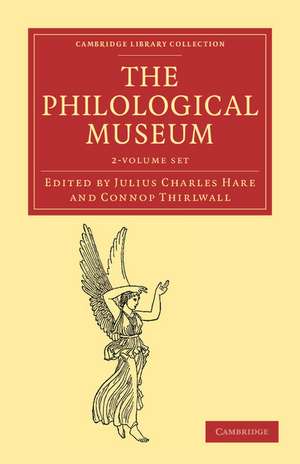The Philological Museum 2 Volume Set: Cambridge Library Collection - Classic Journals
Editat de Julius Charles Hare, Connop Thirlwallen Limba Engleză Quantity pack – 14 noi 2012
Preț: 595.20 lei
Preț vechi: 697.42 lei
-15% Nou
Puncte Express: 893
Preț estimativ în valută:
113.89€ • 119.34$ • 94.15£
113.89€ • 119.34$ • 94.15£
Comandă specială
Livrare economică 28 martie-09 aprilie
Doresc să fiu notificat când acest titlu va fi disponibil:
Se trimite...
Preluare comenzi: 021 569.72.76
Specificații
ISBN-13: 9781108054164
ISBN-10: 1108054161
Pagini: 1432
Dimensiuni: 142 x 218 x 89 mm
Greutate: 1.86 kg
Editura: Cambridge University Press
Colecția Cambridge University Press
Seria Cambridge Library Collection - Classic Journals
Locul publicării:Cambridge, United Kingdom
ISBN-10: 1108054161
Pagini: 1432
Dimensiuni: 142 x 218 x 89 mm
Greutate: 1.86 kg
Editura: Cambridge University Press
Colecția Cambridge University Press
Seria Cambridge Library Collection - Classic Journals
Locul publicării:Cambridge, United Kingdom
Cuprins
Volume 1: Preface; 1. On the names of the days of the week; 2. On the number of dramas ascribed to Sophocles; 3. On the early Ionic philosophers; 4. On certain constructions of the subjunctive mood; 5. Ancaeus; 6. Notice of Payne Knight's Nummi Veteres; 7. Notice of Aristotle's Oeconomics; 8. On the Messapians; 9. Poemata Latina; 10. On the ius Latii, and the ius Italicum; 11. On the Sicelians in the Odyssey; 12. Iliadis Codex Aegyptiacus; 13. Miscellaneous observations; 14. Professor Scholefield's Aeschylus; 15. On the age of the coast-describer, Scylax of Caryanda; 16. On the fables of Babrius; 17. Kruse's Hellas; 18. On English adjectives; 19. Philip of Theangela; 20. Translation of part of the first book of the Aeneid; 21. On the accession of Darius son of Hystaspes; 22. On some passages in the civil and literary chronology of Greece; 23. On the root of 'eileo'; 24. The Journal of Education; 25. Imaginary conversation; 26. On the historical references, and the allusions in Horace; 27. On Xenophon's Helenica; 28. Xenophon, Niebuhr, and Delbrueck; 29. On certain passages in the fourth and fifth books of the architecture of Vitruvius; 30. On a passage in Xenophon's Hellenica; 31. The comic poet Antiphanes; 32. On the names of the antehellenic inhabitants of Greece; 33. De Pausaniae stilo Augusti Boeckhii prolusio academica; 34. On certain fragments quoted by Herodian; 35. On English orthography; 36. On English diminutives; 37. Miscellaneous observations. Volume 2: 1. Imaginary conversation; 2. Dr Arnold on the Spartan constitution; 3. On the Homeric use of the word 'heros'; 4. On affectation in ancient and modern art; 5. De Arati Canone Augusti Boeckhii prolusio academica; 6. Anecdota Barocciana; 7. On the Roman coloni; 8. On the position of Susa; 9. On certain tenses attributed to the Greek verb; 10. Quo anni tempore Panathenaea Minora celebrata sint, quaeritur; 11. Miscellaneous observations; 12. On the use of definitions; 13. On the Attic Dionysia; 14. On the painting of an ancient vase; 15. On certain particles of the English language; 16. On oc and oyl; 17. On the kings of Attica before Theseus; 18. On English praeterites; 19. On the birth-year of Demosthenes; 20. Anecdota Barocciana; 21. On ancient Greek music; 22. De sacerdotiis Graecorum Augusti Boeckhii prolusio academica; 23. De titulis quibusdam suppositis Augusti Boeckhii prolusio academica; 24. Miscellaneous observations; 25. On the irony of Sophocles; 26. On the worth of Socrates as a philosopher; 27. Schleiermacher on Plato's Apology; 28. Socrates, Schleiermacher, and Delbrueck; 29. Simplicius de caelo; 30. Vico; 31. Regia Homerica; 32. Ogyges; 33. Niebuhr on the distinction between annals and history; 34. Hannibal's passage over the Alps; 35. Miscellaneous observations.
Descriere
This two-volume collection, published 1832–3, containing six issues of a short-lived journal, illuminates tensions between classical scholarship and Anglicanism.











